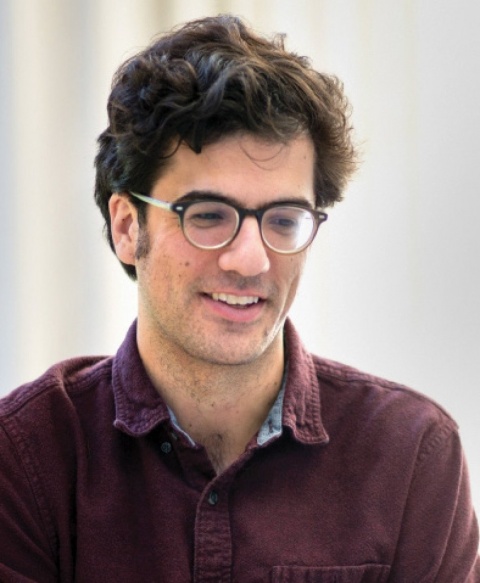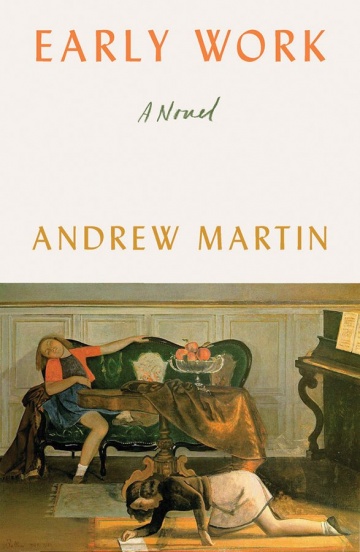Columbia College | Columbia University in the City of New York
Andrew Martin ’08 Redefines the Millennial Novel

LULU LIU
Andrew Martin ’08 does not reflect fondly on his 20s. “I’m grateful to have survived that period of my life,” he says over a bottle of IPA at his beloved college bar, The Dead Poet (a bit on the nose for a struggling writer, he admits).
Luckily for him, that era proved incredibly fruitful for his debut novel. Early Work (Farrar, Straus and Giroux, $16) follows the listless exploits of two writers in their 30s desperately trying to mold a career — and some kind of life — out of the haphazard gigs and romances of their 20s. The book focuses on Peter, a Yale English Ph.D. dropout supposedly working on his novel, but actually spending most of his time in an illicit love affair with Leslie, a fellow writer who ends up unraveling whatever sense of contentment he thought he achieved.
In the vein of Philip Roth (one of Martin’s many literary heroes), the book was somewhat autobiographical. While writing the novel, Martin looked a lot like Peter: an aspiring writer who lived with his longtime medical student girlfriend in Virginia. But despite what readers — or concerned family members — might think, the similarities end there: Peter is the anti-hero Martin manifested out of his darkest fears.

“I wanted to capture that sense of anxiety of being a writer,” Martin explains. “Fear of failure was the biggest part of it, of having spent all this time on something and then it turning out that you can’t do it. I really imagined that, at 23, I was going to publish the great American novel. I applied, quite arrogantly, to the top 10 M.F.A. programs, and thought, ‘Surely one of them will take me.’”
None of them did.
The English major credits his Columbia mentor, the bestselling author and chair of the Undergraduate Writing Program, Professor Sam Lipsyte, for inspiring him to persevere. “After I got rejected, he sent me an email that was really valuable, and said, basically, ‘Screw them. Make your work good enough that they can’t say no.’”
Martin’s persistence paid off. Early Work was named a New York Times Notable Book of 2018 and was included on The New Yorker and Bookforum’s “Best Books of the Year.”
The same self-deprecating wit that won him accolades from the Los Angeles Review of Books (“wall-to-wall with erudite repartee”) and the Chicago Review of Books (“remarkable ear for natural dialogue and pitch-perfect, witty banter”) also makes an appearance in real life.
“When I got turned down from every M.F.A. program I applied to, I was like, ‘I went to Columbia. Do you know who I am? I worked for the Columbia Spectator,’” he quips. “In the scale of life lessons, it’s not exactly like working in a coal mine, but that period of trying to figure out how to become good at something I desperately wanted was really hard. A lot of my friends were journalists publishing good work. So I thought, ‘What am I doing with myself? Am I wasting my life?’”
After the wave of rejections, Martin spent the next year workshopping his writing and got a full ride to the University of Montana M.F.A. program. It took five more years to publish his novel. In between, he taught English, edited magazines or worked in publicity while writing short stories and nonfiction for literary outlets like The Paris Review and Tin House.
His breakthrough came after receiving a paid one-month writing residency at the Ucross Foundation in Wyoming. There, he sat at the computer 10 hours a day, averaging 1,000 words each session. He continued the practice after he left and wrote 450 pages in less than a year.
Martin credits all-nighters at Spectator for instilling the discipline to finish a novel.
“At the paper, because we were so crazy and self-obsessed, it was like, ‘We have to put out this newspaper tomorrow, and it’s worth sacrificing everything else in my life to do this, even if it takes till 2 in the morning,’” he recalls. “That work ethic was hugely important, that sense of ‘I’m going to sit here till I get it done.’ It was the best possible preparation.”
His advice for future Andrew Martins? Bleary-eyed, sleep-deprived, uncompromising resolve.
“You have to acknowledge that it’s going to take up years of your life, and you have to be willing to dedicate your life to it,” Martin says. “It’s really hard to follow through on a novel. It’s easy to start. It’s easy to be in the middle of one. It’s really hard to end one. You’re never going to get anything done unless you’re willing to get rejected 100 times and keep showing up.”
Yelena Shuster ’09 has written for The New York Times, Cosmopolitan, InStyle and more. Her CCT Fall 2018 cover story, “Star Power,” won the Folio Eddie Honorable Mention and a CASE Silver Award. She founded and runs TheAdmissionsGuru.com, where she edits admissions essays for high school, college and graduate school applications.
Issue Contents
Published three times a year by Columbia College for alumni, students, faculty, parents and friends.
Columbia Alumni Center
622 W. 113th St., MC 4530, 6th Fl.
New York, NY 10025
212-851-7852
cct@columbia.edu
Columbia Alumni Center
622 W. 113th St., MC 4530, 4th Fl.
New York, NY 10025
212-851-7488
ccalumni@columbia.edu

